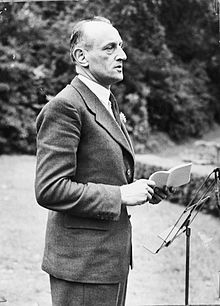Gerrit Jan van Heuven Goedhart
| Gerrit Jan van Heuven Goedhart | |
|---|---|
 |
|
| Van Heuven Goedhart (Regent's Park London, 1944) | |
| United Nations High Commissioner for Refugees | |
|
In office January 1, 1951 – July 8, 1956 |
|
| Preceded by | None |
| Succeeded by | Auguste R. Lindt |
| Senator | |
|
In office October 22, 1947 – January 1, 1951 |
|
| Monarch |
Wilhelmina Juliana |
| Minister of Justice | |
|
In office July 12, 1944 – February 23, 1945 |
|
| Preceded by | Johannes Regnerus Maria van Angeren |
| Succeeded by | Pieter Sjoerds Gerbrandy |
| Personal details | |
| Born |
Gerrit Jan Goedhart March 19, 1901 Bussum, Netherlands |
| Died | July 8, 1956 (aged 55) Geneva, Switzerland |
| Nationality | Dutch |
| Political party | Labour Party |
| Spouse(s) | Francis Becht (1924-1931) Erna Hauan (1932-1956) |
| Alma mater | Leiden University (Dr.) |
| Occupation |
Politician Diplomat Journalist |
| Awards |
Knight in the Order of the Netherlands Lion (1949) 1954 Nobel Peace Prize (1954; as UNHCR) Wateler Peace Prize (1956) |
Gerrit Jan van Heuven Goedhart (March 19, 1901 – July 8, 1956) was a Dutch politician and diplomat. He was the first United Nations High Commissioner for Refugees (1951–1956).
Van Heuven Goedhart studied Law at Leiden University and graduated in 1926. The year before, he had already become a reporter for newspaper De Telegraaf. On January 1, 1930, at the age of 28, he was promoted to editor in chief. He was fired on June 1, 1933, because he refused to publish an article that called the newly elected German leader Adolf Hitler "a great statesman". He became editor in chief of regional newspaper Utrechts Nieuwsblad, where he would stay in office until the German invasion of the Netherlands.
During the Second World War, Van Heuven Goedhart worked as a reporter and editor in chief for the illegal resistance newspaper Het Parool. In 1944 he fled to London, where he was appointed Minister of Justice in the government in exile.
After the Second World War, Van Heuven Goedhart returned to Het Parool, where he once again become editor in chief. In 1947, he also became Senator for the Labour Party. In 1951, he gave up both occupations to become the first High Commissioner for Refugees of the United Nations. Under Van Heuven Goedhart, the UNHCR was awarded the 1954 Nobel Peace Prize.
...
Wikipedia
